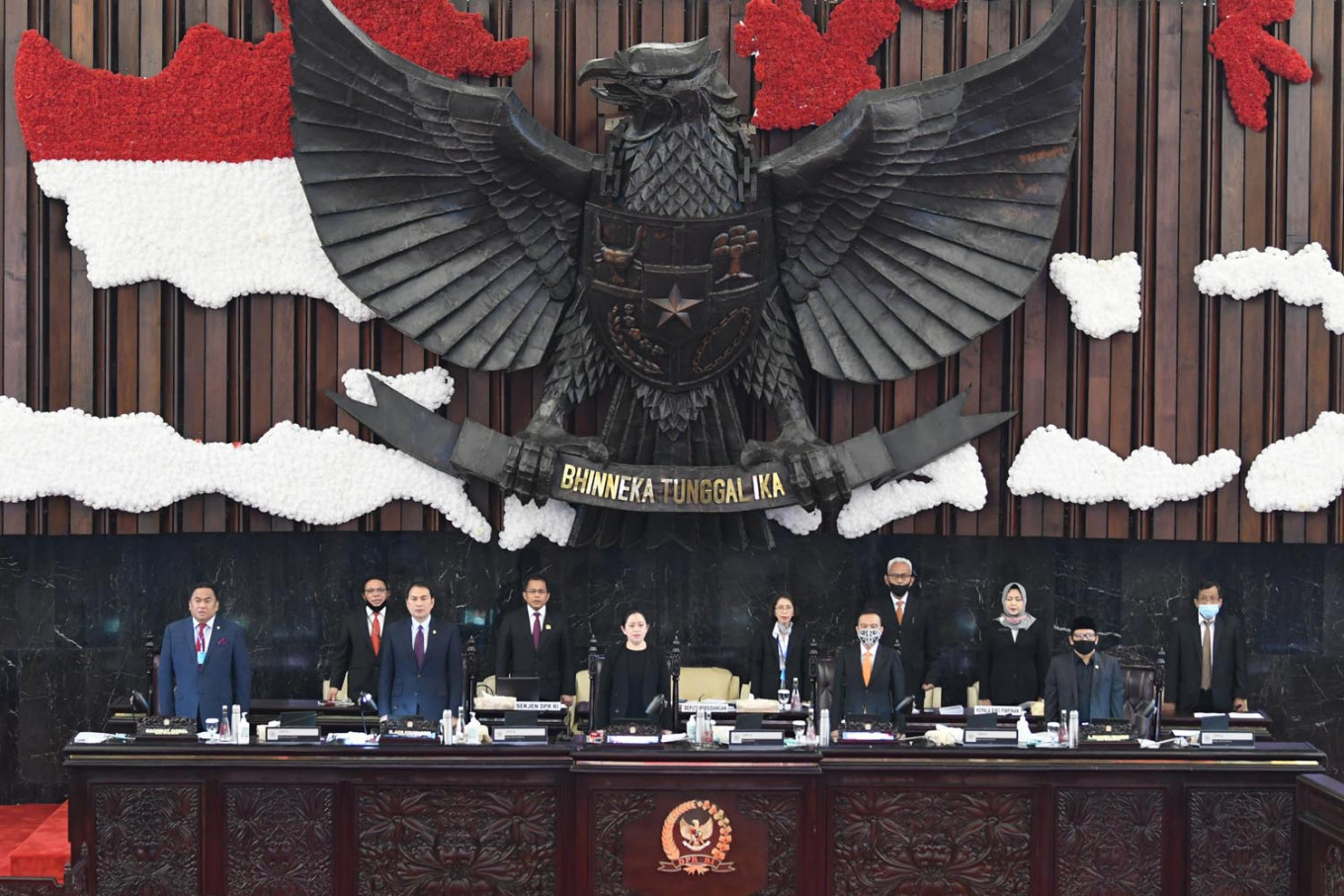Popular Reads
Top Results
Can't find what you're looking for?
View all search resultsPopular Reads
Top Results
Can't find what you're looking for?
View all search resultsHouse hastily passes overhauled tax law
The Harmonized Tax Law revised four related laws in one fell swoop
Change text size
Gift Premium Articles
to Anyone
T
he House of Representatives passed a bill on Thursday to overhaul the country’s tax system after what has been called one of the hastiest deliberations in Indonesia’s modern legislative history.
The Harmonized Tax Law (HPP), previously called the Amended General Taxation Law, raises income taxes on the rich, increases value-added taxes (VAT) and scraps a proposal to cut corporate income taxes. It also introduces carbon taxes, a second tax amnesty period and a plan to swap taxpayer identification numbers (NPWP) with identity card numbers (NIK) for easier tracking.
The government expects the changes to boost state revenue before the country reinstates the budget deficit ceiling of 3 percent of gross domestic product (GDP) in 2023. Lawmakers lifted the cap last year to accommodate more than a billion dollars of spending for COVID-19 relief.
The passage of the HPP marks the government’s second use of the “omnibus law” method, whereby a single piece of legislation revises multiple others at once. The new tax law amends the General Taxation Law, the Income Tax Law, the VAT Law and the Stamp Duty Law.
"I ask all members at this second-level meeting again: Can we agree to pass the bill into law?” asked House Deputy Speaker Abdul Muhaimin Iskandar at a live-broadcast plenary session in Jakarta on Thursday, before rapping his gavel on the podium.
Eight of the nine parties in the House agreed to pass the bill, with the Prosperous Justice Party (PKS) withholding its support.
Law and Human Rights Minister Yasonna Laoly said the new law was an important part of the country’s tax reform efforts, which supporters hope will boost GDP growth, hasten the economic recovery and improve state revenue.
“The COVID-19 pandemic has provided an opportunity to accelerate the tax reform process to reorganize the Indonesian tax system to adopt best practices and social dynamics for the future,” said Yasonna at the session.
Read also: Key points from impending new tax law
The deliberation of the bill officially began on June 22, when the president sent a letter to the House on the matter. Lawmakers began first-level discussions on Sept. 13 and approved a draft bill on Sept. 29 in a meeting closed to the public. Lawmakers also kept the June and early October drafts from public scrutiny.
The government made several alterations to the bill over the course of the deliberations. The initial draft, for example, sought to introduce a 12 percent VAT from the time of the law’s passage, as well as an alternative minimum tax for loss-making companies, many of which have been accused of faking losses to evade taxes. In the enacted version of the law, VAT will increase to 12 percent gradually and the alternative minimum tax has been scrapped.
Bank Permata economist Josua Pardede said the new law could help reduce the tax shortfall next year, support the country’s fiscal consolidation and ensure fiscal sustainability over the long term. However, he warned that the rise in VAT, among other provisions, could work against the economic recovery.
“The rise in VAT will be reflected in a price hike for goods and services, so it could hamper the recovery of household purchasing power in the first one or two quarters after implementation,” Josua told The Jakarta Post on Thursday, adding that the government should make up for this effect with better social aid.
Many observers have noted the unexpected haste of the law’s enactment, particularly because the Finance Ministry, which won the highest commendation from the Central Information Commission (KIP) for public information disclosure for eight consecutive years starting in 2013, is considered one of the country’s most transparent ministries.
Indonesian Legislative Watch (Formappi) researcher Lucius Karus told the Post on Thursday that it was “odd” for the House to finish deliberating a law within weeks. The process normally took months or even years.
The business-oriented Job Creation Law and the new Mining Law had similarly hasty deliberations and little transparency, while work on the public-oriented data protection bill and sexual violence eradication bill has been postponed several times.
“This is abnormal. The House often takes a long time to finish deliberating a bill,” Lucius said. “This [change] was on purpose, and a quick discussion was prepared for so that the public would not have time to provide input or criticism."
Read also: Overarching tax reform
Indonesian Consumers Foundation (YLKI) secretary Agus Suyatno and Indonesian Forum for Budget Transparency (Fitra) secretary-general Misbah Hasan echoed Formappi's criticism of the opaqueness of the process.
"It is normal [under these circumstances] to be suspicious about whether the law is actually in the public interest or just in the interest of political party elites,” said Misbah.
Agus noted that the proposal to introduce VAT for certain staple foods, as well as educational and health services, had been met with public outrage as many expected the new policy to cause prices to rise.
“In practice, the law will affect the general public. When there is a policy or law that concerns the community at large, it is supposed to be explained clearly to the public,” he said.










